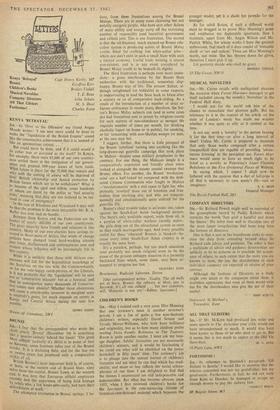B RUNEI fear that the correspondent who wrote the short article
'Brunei' (December 14) is something like a quarter-century behind the times! 'The great Meri oilfield' (actually it's Miri) is in point of fact in Sarawak, some fourteen miles east of the Brunei border. It is a declining field, and for the last ten
or twelve years has produced only a comparative trickle of oil.
British Borneo's most important field is, of course, at Seria, at the 'eastern end of Brunei State, sixty miles from the capital, Brunei Town, at the western end. It was here that European oilfield employees recently had the experience of being held hostage by rebels who a few hours previously, had been their subordinates at work. The attempted revolution in Brunei 'springs, I be-
lieve, from three frustrations among the Brunei Malays. These are in many cases charming but not notably energetic people, who have seen other Asians of more ability and energy carry off the increasing number of responsible (and lucrative) government and oilfield jobs. This is one frustration. The second is that the oil-financed, much stepped-up Brunei edu- cation system is producing scores of Brunei Malay youths fitted for nothing but white-collar jobs— which just don't exist in such a small State with such a limited economy. Useful trade training is almost non-existent, and is in any event considered by Brunei Malay youth to be beneath its dignity.
The third frustration is perhaps even more imme- diate: a gross interference by the Brunei State authorities with. the traditional, somewhat slap- happy. Brunei way of life. The present Sultan, al- though enlightened (or biddable) in some respects, is endeavouring to lead the State back to Islam after a century or so of comparative back-sliding. As a result of the introduction of a number of strict re- ligious ordinances in recent years, therefore, the Sul- tan's Brunei Malay subjects can (and in some cases do) find themselves sent to prison by religious courts for such matters of non-attendance at mosque the requisite number of times per month, for drinking alcoholic liquor (at home or in public), for smoking, or for 'consorting' with non-Muslim women (or men, as the case may be).
I suggest, further, that there is little prospect of the Brunei 'rebellion' turning into anything like the long-drawn-out guerrilla campaign that took place in Malaya—despite some military prophecies to the contrary. For one thing, the Malayan jungle is a comparatively populated and friendly place when looked at alongside the steamy coastal swamps that Brunei offers. For another, the Brunei 'revolution- aries' are a half-baked lot compared with the dedi- cated Chinese Communists who fought in Malaya =revolutionaries' with a real cause to fight for, who probably 'revolted' more out of boredom and frus- tration than anything else, and who are tempera- mentally and constitutionally quite unfitted for the guerrilla life. Brunei's chief trouble today is an'ironic one, taken against the South-East Asian background picture. The State's only available export, aside from oil, is a surplus of white-collar workers (mostly males: the girls drop out of the educational system as soon as they reach marriageable age). And every possible outlet for these .`educated' Bruneis is blocked—be-. cause every other South-East Asian country is in exactly the same boat. It's a paradox, perhaps, but too much education (and probably too much religion) seem to be the cause of the present unhappy situation in a formerly backward State which, some think, may have at- tempted to progress too fast.
GEOFFREY KERR
Braemoray, Budleigh Salterton, Devon
[Our correspondent writes: 'Guilty. The oil wells are at Seria, Brunei; the refinery at Meri, just in Sarawak. It's all one oilfield . . . but two countries, still, Malaysia is not yet.'—Editor, Spectator.]




























 Previous page
Previous page